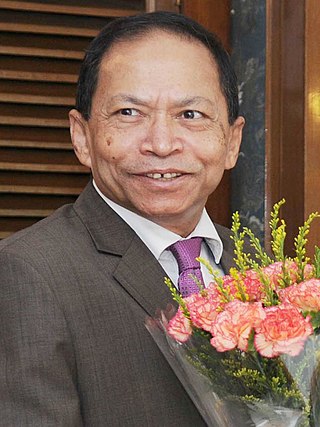Related Research Articles

The Supreme Court of Bangladesh is the highest court of law in Bangladesh. It is composed of the High Court Division and the Appellate Division, and was created by Part VI Chapter I of the Constitution of Bangladesh adopted in 1972. This is also the office of the Chief Justice, Appellate Division Justices, and High Court Division Justices of Bangladesh. As of January 2024, there are 8 Justices in Appellate Division and 89 Justices in High Court Division.

The first president of Bangladesh, Sheikh Mujibur Rahman, and most of his family were killed during the early hours of 15 August 1975 by a group of Bangladesh Army personnel who invaded his Dhanmondi 32 residence as part of a coup d'état. Minister of Commerce, Khondaker Mostaq Ahmad, immediately took control of the government and proclaimed himself president. The assassination marked the first direct military intervention in Bangladesh's civilian administration-centric politics. 15 August is National Mourning Day, an official national holiday in Bangladesh.

The High Court Division, Supreme Court of Bangladesh popularly known as the 'High Court' is one of the two divisions of the Supreme Court of Bangladesh, the other division being the Appellate Division. It consists of the Chief Justice of Bangladesh and the Judges of the High Court Division.
Mustafa Kamal was the 9th Chief Justice of Bangladesh. His landmark judgment was on the Masdar Hossain case, widely known as the 'separation of judiciary', which was a milestone in the quest for separation of power between the judiciary and the executive of the state. Kamal was a pioneer of alternative dispute resolution (ADR) in Bangladesh, and is considered by many as the 'father of ADR' in Bangladesh.
Md. Muzammel Hossain is a Bangladeshi jurist who served as the 20th Chief Justice of Bangladesh.

Surendra Kumar Sinha, commonly known as SK Sinha is a Bangladeshi lawyer and jurist who served as the 21st Chief Justice of Bangladesh. He resigned from the position in November 2017 amid the 16th amendment verdict controversy.

Anisul Huq is a Bangladeshi lawyer and politician. He has been the Bangladesh government's Minister for Law, Justice and Parliamentary Affairs since 2014.
Mohammad Fazlul Karim is a Bangladeshi jurist who served as the 18th Chief Justice of Bangladesh.

Rafique Ul Huq was a Bangladeshi barrister who served as the Attorney General of Bangladesh in 1990.

The 15 August 1975 Bangladesh coup d'état was a military coup launched by mid ranking army officers in Bangladesh on 15 August 1975. The officers were part of a conspiracy to assassinate Sheikh Mujibur Rahman, the founding father of Bangladesh, who led the independence struggle during the Bangladesh Liberation War and later served as the first and fourth president and later in between his two presidential terms served as the second prime minister of Bangladesh from April 1971 until his assassination in August 1975. Sheikh Mujibur Rahman and most of his family members were killed during the coup, with the exception of his two daughters Sheikh Hasina and Sheikh Rehana.

Mohammad Kismat Hashem was a Bangladesh Army officer who was convicted for his role in the 1975 Jail Killing following the Assassination of Sheikh Mujibur Rahman, the President of Bangladesh.
Mamnoon Rahman is a Bangladeshi justice of the High Court Division of Bangladesh Supreme Court. He was appointed in 2004.
The Fifth Amendment to the Constitution of Bangladesh inserted "In the name of Allah, the Beneficent, the Merciful" at the beginning of the constitution and validated all laws made by military rulers following the 15 August 1975 Bangladesh coup d'état. It was passed in 1979 under a parliament led by President Ziaur Rahman. The amendment fundamentally altered the nature of the constitution of Bangladesh. The amendment was declared illegal in a verdict of the Supreme Court in 2010. The Fifteen Amendment to the Constitution of Bangladesh, passed in 2011, restored secularism.
Shah Abu Nayeem Mominur Rahman was a justice on the Appellate Division of Bangladesh Supreme Court. He resigned from the Supreme Court after being twice passed over from promotion.
Md. Ashfaqul Islam is a judge of the Appellate Division, Supreme Court of Bangladesh.
A. S. M. Abdul Mobin is a Justice of the High Court Division of the Bangladesh Supreme Court.
Mohi Uddin Shamim is a Justice of the High Court Division of the Bangladesh Supreme Court.
Sardar Md. Rashed Jahangir is a Justice of the High Court Division of the Bangladesh Supreme Court.
Md. Aminul Islam is a Justice of the High Court Division of the Bangladesh Supreme Court. He is a former Deputy Attorney General of Bangladesh.
Gour Gopal Saha was a retired Justice of the High Court Division of the Bangladesh Supreme Court and a Hindu community activist.
References
- 1 2 3 4 5 6 7 "Life sketch of newly appointed Chief Justice of Bangladesh". Bangladesh Sangbad Sangstha. 2009-12-23. Archived from the original on 2016-03-04.
- ↑ "Founding Members". Shakti Foundation for Disadvantaged Women.
- ↑ "Bangladesh International Arbitration Centre: Profile of Justice Tafazzul Islam" (PDF). Archived from the original (PDF) on 2016-03-05. Retrieved 2015-07-27.
- ↑ "Full text of 5th Amendment Verdict" (PDF).
- ↑ "Full text of the Sheikh Mujibur Rahman Verdict" (PDF). Archived from the original (PDF) on 2015-03-01.